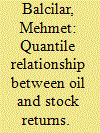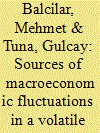| Srl | Item |
| 1 |
ID:
134028


|
|
|
|
|
| Publication |
2014.
|
| Summary/Abstract |
This paper contributes to the growing literature on the milex-growth nexus, by providing a case study of South Africa and considering the possibility of structural breaks by applying newly developed econometric methods. Using full sample bootstrap Granger non-causality tests, no Granger causal link is found between military expenditure and GDP for 1951-2010, but parameter instability tests show the estimated VARs to be unstable. Using a bootstrap rolling window estimation procedure, however, finds evidence of bidirectional Granger causality in various subsamples. This implies standard Granger non-causality tests, which neither account for structural breaks nor time variation may be invalid.
|
|
|
|
|
|
|
|
|
|
|
|
|
|
|
|
| 2 |
ID:
169756


|
|
|
|
|
| Summary/Abstract |
This study extends the literature on the asymmetric effect of oil price fluctuations on emerging and frontier stock markets via a quantile-on-quantile approach that allows to capture normal and extreme states in each respective market. We find that oil risk exposures are heterogeneous across the emerging and frontier stock markets and indeed display quantile-specific characteristics. Observing uniform patterns of oil risk exposures within groups of countries that include both importers and exporters, we argue that oil price risk serves as a systematic risk proxy, capturing the market's concerns regarding global growth expectations, rather than a simple import/export commodity. Our findings suggest that signals from the oil market, either via measures of trading activity in oil futures or changes in basis values, could be utilized by policy makers to improve models of stock market volatility.
|
|
|
|
|
|
|
|
|
|
|
|
|
|
|
|
| 3 |
ID:
093663


|
|
|
|
|
| Publication |
2009.
|
| Summary/Abstract |
This paper studies the sources of macroeconomic fluctuations in a typical small open economy, Turkey, using a structural vector autoregressive (SVAR) model. The study finds that supply-side shocks are the main source of output fluctuations in the long run, explaining almost half the variance of domestic output. However, most of the short-run variability in domestic output is dominated by relative demand shocks. Aggregate demand shocks do not appear to play any significant role in output fluctuations in the long run. Changes in fiscal policy play a moderate role in determining the real exchange rate in the short term, while changes in world output and prices of imported inputs are the major determinants of the long-term real exchange rate. The long-run price variations are mainly due to oil price and world output shocks.
|
|
|
|
|
|
|
|
|
|
|
|
|
|
|
|